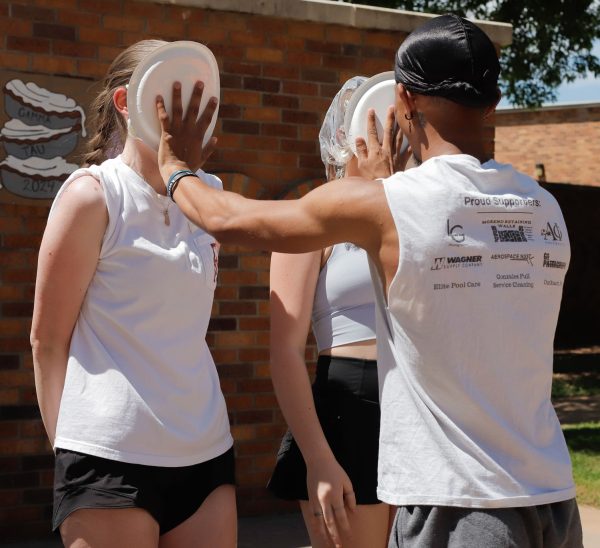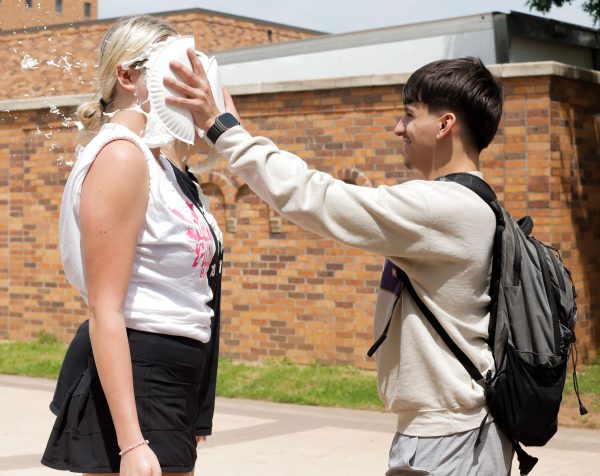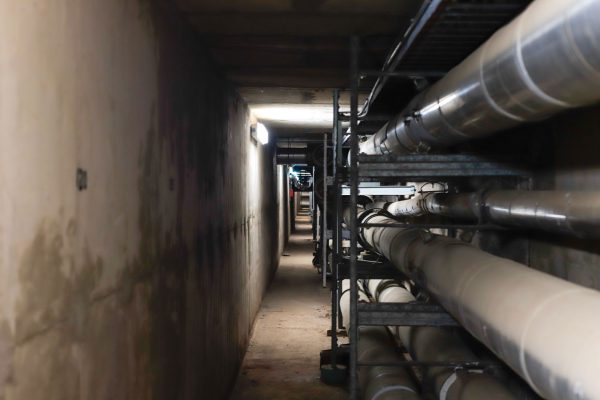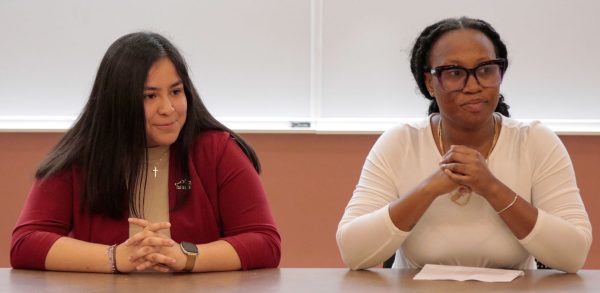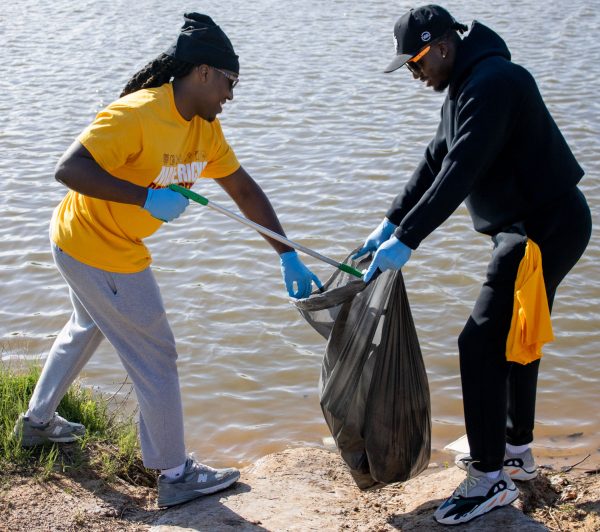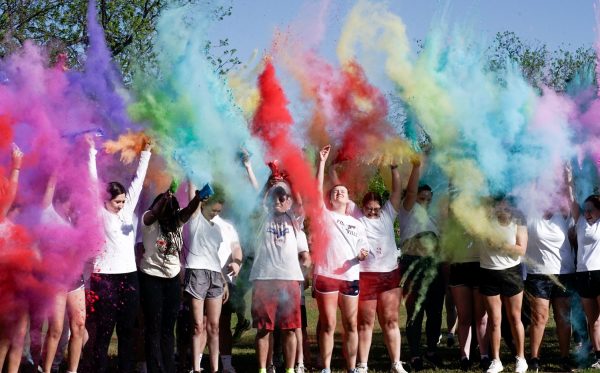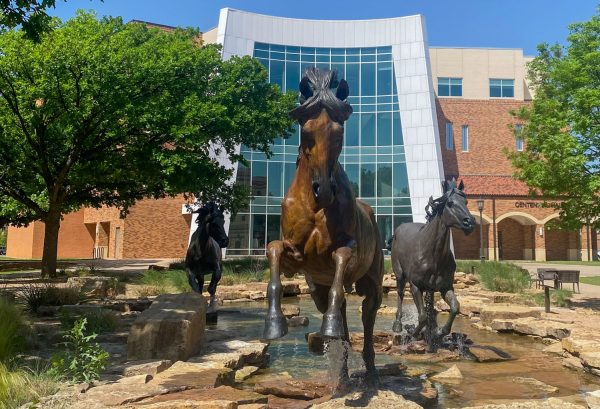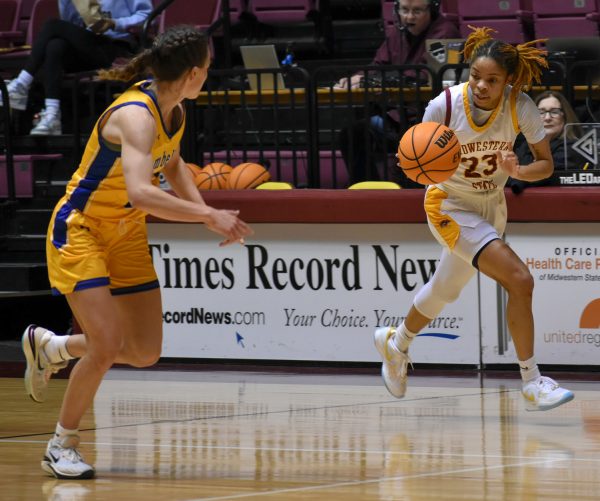Four sides to the same Musical: A look into the different roles that make Urinetown, Urinetown
February 14, 2018
Four individuals, four massive pieces to such a large production. A technical hand in charge of construction, a head dresser directed to maintain costumes to preserve them for each production, assistant stage manager tasked with organizing schedules and being the hands ready to move in whatever way necessary and an actor that captures the moments of this dystopian satire. Benjamin Ashton, technical director, Kaylor Winter-Roach, head dresser, Ron Harle, assistant stage manager, and Samuel Mitchell, lead actor as Bobby Strong answer how their unique roles combine to pull off the musical Urinetown.
Question 1: What is your role and the importance of your role for the success of the musical?
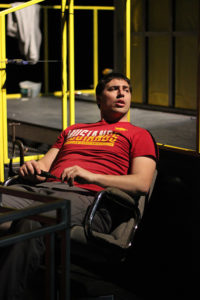
Benjamin | “My position is technical director. I pretty much facilitate all things technical that do not involve costumes, so my job is to make sure that people are on time, doing the things they need to do, and making sure that things are kind of progressing as they need to in the order that they should and that things are working together with rehearsals.”
Kaylor | “I’m the costume shop manager, I just pretty much run the shop upstairs and make sure that everything gets built and that everything stays organized so that we don’t lose things because it happens, that we lose things…I’m also the head dresser for this show, so when the show starts running, I make sure that everything is kept clean pretty much. I also help backstage, like my crew and I will help do quick changes, so if the actor needs help behind the stage, we make sure that they can get dressed to be on stage on time for their que. We also afterwards wash all the [garments].”
Ron | “I’m the assistant stage manager of Urinetown the Musical and a stage manager’s primary goal, just being apart of the stage management team, is to ensure that a show and rehearsals run smoothly and the actors are cared for.”
Samuel | “My role is Bobby Strong, and whenever it comes to importance, I’m kind of the catalyst of the revolution that really sparks the events of the entire play. Them having to pay to pee is the reason I start the revolution and that is what makes the entire back three quarters of it that happen.”
Question 2 : As a [insert role here] what is expected of you?
Benjamin| “Pretty much my main thing is to available to everybody and anybody that might need me. Making sure that by the end of the day that everything is 100% safe for actors, for anybody walking through that might get lost.”
Kaylor | “I’m expected to have actors downstage on time, fit, and ready to go, because if they don’t, then they call me to ask me why they aren’t ready yet. I pretty much, after they put on their makeup and their hair on, I have to make sure that people start getting into their costumes on time, so we don’t have to hold the house like five minutes or something. Then that’s annoying to the stage manager and the people who came on time to see the show. I’m Mama Hen upstairs, along with the makeup person.”
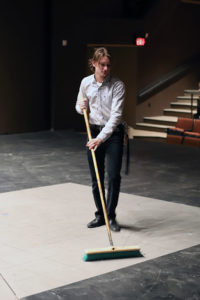
Ron | “Some of the things that are expected of me as an assistant stage manager are, well, honestly primarily sweeping before rehearsal, just to make sure it is clean. We can’t have our actors stepping on screws or anything like that left by the set crew. Medical needs come up fairly often, as far as an actor knicks themselves on a set or needs a cough drop or anything like that.”
Samuel | “This is going to sound weird, but to not act because acting, I’m in an acting class right now, and acting is the reality of doing, so it is more about, whenever I’m on stage I’m doing what Bobby Strong is doing, instead of acting out what Bobby Strong would be doing. So it is kind of weird, but that is what is expected of me, it’s to do, not to act.”
Question 3: What is it that makes you successful at your job?
Benjamin | “Mine would definitely have to be the Professor Koger and his teaching of how to do things, the right things to do things, and doing things the right way has probably made me the most successful at my job.”
Kaylor | “Keeping Calm 24/7. You are supposed to keep calm, especially backstage…It is all about keeping your cool and having a strong hand and making sure that your actors know that you got them. Like I said, it’s like Mama Hen, being the bigger person, being like I got you and if you let me have you everything will go good. Because once they start freaking out, that’s the end of it. An actor when they start freaking out, is the worst thing because you get to stay behind stage and you can freak out, but they can’t go on stage and freak out.”
Ron | “I feel I have a fairly caring and want to help heart, which makes me decent as a stage manager because that’s what we are, we have been called the moms or the nurses of the department because that is what we are. We just care for and establish what is needed.”
Samuel | “I came into this semester just ready to hit the ground running, wel not to hit the ground running, but I was ready to put in as much work and as much effort as possibly needed to do this so I feel like I’ve been working pretty hard. I think, I don’t know if it is showing, but hopefully it will be by opening night. I’ve just been putting in a lot of time and really working for this.”
Question 4: What have you learned/gained from this experience?
Benjamin | “I don’t know off the top of my head because there’s been a lot of its and bits of pieces that I have learned. Probably the most impactful has been precision welding.”
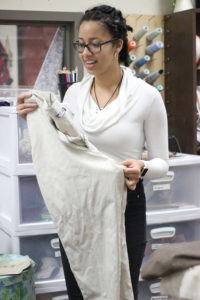
Kaylor | “ I’ve learned to have more patience with things, because not everything goes as you go, and now you are working with more people than you are used to than working in a smaller show. So there is a lot of communication problems that can happen, and when that happens you just gotta figure it out, so I have to learn to have patience and not get angry with people and not get angry with myself because you can’t beat yourself up because then you can’t do your work afterwards.”
Ron | “I have learned a lot from this musical, it has been a great growing experience for me doing this musical because in a college environment it’s very different from my high school environment and its much more professional, much more efficient, and a lot more is expected from you. Which has been a great experience for me because it allows me to grow in responsibility and understanding.”
Samuel | “I’ve learned alot about reading and singing from music because I have never done that before. I’ve just heard a song and sang it, but the way we are performing this is very different from the broadway version, which is all the recording, so I can’t listen to those because it throws me off from what we are doing now. It’s just having to really practice what we do and not having anything to listen to, but recording of our own practice.”
Question 5: What is the hardest thing you’ve had/will have to overcome, face, or do?
Benjamin | “Not having the man power, and not having enough time in a day.”
Kaylor | “Well dress starts next week and we’re not done yet, so I think that’s the hardest thing that we are going to have to deal with. We might have to come in this weekend and put in extra hours and that’s just not fun because I get paid for this because I work up here, and I don’t get paid for those extra hours, so it’s honestly just heart going into it afterwards.”
Ron | “One of the hardest things about this musical particularly is that this musical, we’ve thrown it together in about six weeks when normally you are going to do a musical in two and a half months or somewhere around that, a little bit longer time frame. It’s a very, very big musical. As with most musicals, there’s a decent sized cast, there’s about 20 or so I think, the numbers have changed because some people have dropped out. It’s a very large set, there’s a lot of metal involved and a lot of painting, which is a very arduous task. I would say the time framing is the most difficult thing we have encountered.”
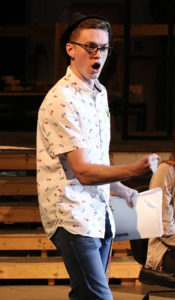
Samuel | “Probably back to the singing thing, I feel confident in my abilities as an actor, and then there are a few songs where I feel good, but that’s where I feel a little shaky, not shaky, but I know that that’s the part that I’m, that’s my “weak link” is my singing. I’ve been trying to get better at that, trying to do good, I’m one of the leads so I want it to be good, I want it to be great.”
Question 6: About how many hours a week, whether at the school or at home, do you spend working on things Musical related?
Benjamin | “So at home, prepping for the next day, would probably be like two hours, so two times seven. Then at least nine hours a day and then usually Saturday I work an extra five hours. So I would say about eighty hours a week.”
Kaylor | “Almost 20 hours a week, but that’s like a normal part time job week, so it’s not that bad, those are the hours I put in for work, but outside I’d probably stay here for an extra hour and then when I go home I got a log and stuff to fill out. I know one day I spent three hours updating something. Then this last weekend we were here from 11 to 7, on Saturday. Actually let’s say 35 hours.”
Ron | “1 to 5, then 6 to 10, six days week, now it’s seven, and then a lot fo after rehearsal calls until 1 a.m. to 3 a.m., anywhere in there. Plus the workdays on the weekends. I’d say on an average week, about 56 hours.”
Samuel | “I would say close to 25 hours a week. Somewhere between 22 and 25 hours. Actually it’s probably close to 30 now that I think about it.”
Question 7: If you weren’t [current role], which role would you have gone for and why?
Benjamin | “Probably the other position I would’ve gone for would’ve been Master Carpenter and the reason I would’ve gone for that is mainly because it still involves building the set, but it involves more of just building the set. Not so much the overall boundless part of technical directing.”
Kaylor | “I wanted to be paint charge because I really like painting. I don’t find it stressful, I find it easy going, even if things are in a rush, I still don’t find it stressful, I’m just like I’m painting it’s fun. If I didn’t get that I still would be up here, I’d still be up here doing the same things, not so much the managing part.”
Ron | “I’m definitely under-qualified for this position, but the one that I strive to get one day, again I’m under-qualified for it at this point in my career or academia, but I definitely would enjoy being a Technical Director who is responsible for ensuring that all areas of the tech side of the show and are completed on time and to the specifications of the designers.”
Samuel | “I would’ve wanted to be Lockstock. I wanted to either be Lockstock or Bobby, because one, Bobby is the lead and I like him, he’s just a fun character, but then Lockstock’s the narrator. I’ve played a narrator in a play before this and being a narrator is always fun time just because I like breaking the fourth wall like that. So being able to do that and it actually being intended and being able to narrate what’s going on, I would love to do that.”
Additional Reporting by Francisco Martinez.

Related Stories
- ‘Urinetown’ musical coming in spring
- Urinetown cast met for first rehearsal
- Home-school student joins musical cast
- ‘Urinetown’ stage managers keep show organized
- Cruz one of 20 in ‘Urinetown’
- Four sides to the same Musical: A look into the different roles that make Urinetown, Urinetown
- Wardrobe stitches musical together
- Makeup makes the characters
- “Urinetown” opening night rescheduled due to inclement weather
- ‘Urinetown’ opening night draws crowds
- Satirical ‘Urinetown’ ‘ranks up there’ for musicians
- ‘Urinetown’ provides a night of entertainment
- ‘Urinetown’ run complete; strike begins March 5



